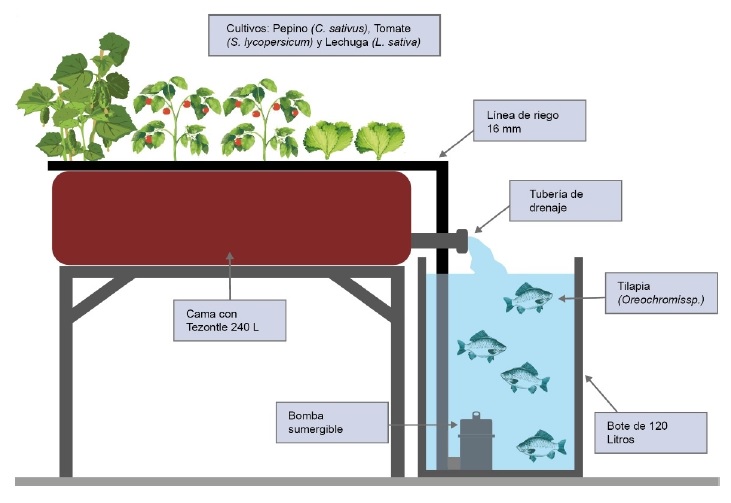Efecto de la granulometría del tezontle en tomate (Solanum lycopersicum L.), pepino (Cucumis sativus L.) y lechuga (Lactuca sativa L.) en acuaponía
DOI:
https://doi.org/10.28940/terra.v41i0.1598Palabras clave:
diámetro de partícula, bacterias nitrificantes, peces, vegetalesResumen
Aquaponics is a complex food production system where fish and vegetables are produced simultaneously. Microorganisms, fish and plants participate in it; it is a complex system where conditions conducive to fish may not be suitable for microorganisms and plants. The diameter of the substrate particles for plant support and space for microorganism colonies can be a determining factor in aquaponics. This research investigates the particle size of tezontle, a porous red volcanic gravel that is used in Mexico for hydroponics and that here it is hypothesized that there is a particle size of this material that favors the growth and yield of plants in aquaponics. The model consisted of the use of 12 containers of 120 L as ponds for fish, and 12 tubs of 240 L for the substrate and a 120 L/min air pump to supply auxiliary oxygenation to the ponds. Three crops were established in each tub: tomato, cucumber, and lettuce. These cultures were transplanted in 3 tezontle diameters: particle diameter less than 1 cm (Æ<1), greater than 5 cm (Æ>5) and 50:50 % (v:v) mixture of both diameters (<1:>5), which constituted the substrate particle diameter treatments. There was no effect of substrate particle diameter on height, stem diameter, and SPAD readings in tomato, cucumber or lettuce plants. Regarding the yield and quality of tomato fruits (firmness, titratable acidity and ˚Brix) there were also no effects of the particle diameter of the substrate. There was also no effect of treatments on the morphological and quality variables of cucumber fruits. In the final fresh weight of lettuce, the treatment with substrate with diameter <1 cm was statistically superior to diameter >5 cm with averages of 89.87 g and 50.12 g respectively. Particle diameter does not affect the yield or quality of established crops, however, in practical terms the fine substrate < 1 cm is recommended because it has greater moisture retention capacity and greater surface area for bacteria to colonize the environment, and promote higher plant growth and fruit quality in aquaponics. The fine substrate acts as a filter to retain suspended solids and prevents clogging of the system, and improves water quality and generates better living conditions for fish.
Descargas
Publication Facts
Reviewer profiles N/D
Author statements
- Academic society
- Terra Latinoamericana

















